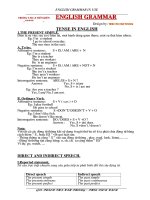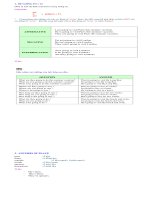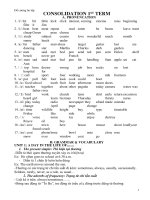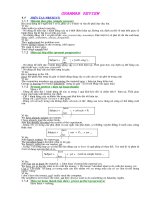Grammar notes
Bạn đang xem bản rút gọn của tài liệu. Xem và tải ngay bản đầy đủ của tài liệu tại đây (68.88 KB, 5 trang )
Simple Capitalisation Guide
• Capitalisation
Capital letters are used for two main purposes in
English:
• to show the beginning of a sentence
• to show that a noun is a proper noun.
1. The first letter of every new sentence is capitalised.
For example:-
The postman delivered the parcel. It was very heavy.
2. The pronoun I is always capitalized.
For example:-
My name is Lynne, I am a teacher.
3. Proper nouns ( also called proper names) are the
words which name specific people, organisations or
places. They always start with a capital letter.
For example:-
Each part of a person's name is a proper noun:-
Lynne Hand - Elizabeth Helen Ruth Jones ...
The names of companies, organisations, newspapers or trade marks:-
Microsoft - Rolls Royce - the Round Table - the Times -
WWW
Given or pet names of animals:-
Lassie - Champion - Trigger - Skippy - Sam
The names of cities and countries and words derived from those proper nouns
such as languages:-
Paris - London - New York - England - English - French
Geographical and Celestial Names:-
the Red Sea - Alpha Centauri - Mars - the River Thames
Particular places such as streets, monuments, buildings, meeting rooms:-
Manvers Road (the road), the Taj Mahal - the Eiffel Tower
(the tower) - Room 222 (the room)
Historical events, documents, acts, and specific periods of time:-
the Civil War - the Declaration of Independence - the
Freedom of Information Act - World War I -
Months, days of the week, holidays and special days:-
December - Monday - Christmas - Valentine's Day (note
seasons are not capitalised spring - summer - autumn -
winter)
Religions, deities, scriptures:-
Christ - God - Jehovah - Mohammed - Christianity - Islam
- Judaism - the Bible - the Koran - the Torah
Awards, vehicles, vehicle models and names, brand names:-
the Nobel Peace Prize - the Scout Movement - Ford Focus
- the Bismarck - Kleenex - Hoover
!Note - You don't need to capitalise the name of any
currency in English.
Simple Pluralisation Guide
• Plural Noun Forms
Regular Plurals
The plural form of most nouns is created simply by
adding the letter 's' to the end of the word .
For example:-
• minute - minutes
Nouns that end in -ch, -x, -s, -sh, z or s-like sounds, the
plural is formed by adding 'es' to the end of the word.
For example:-
• church - churches | box - boxes | gas - gases | bush -
bushes | ass - asses
Nouns that end in a single -z, the plural is formed by
adding 'zes' to the end of the word.
For example:-
• quiz - quizzes
Most nouns ending in -o preceded by a consonant also
form their plurals by adding 'es' .
For example:-
• potato - potatoes | tomato - tomatoes | volcano -
volcanoes
However many newly created words and words with a
Spanish or Italian origin that end in -o just add an 's'.
For example:-
• photo - photos | piano - pianos | portico - porticos
Nouns ending in a consonant + y, drop the y and add
'ies'.
For example:-
• party - parties | lady - ladies
Most nouns ending in -f or -fe, drop the f and add 'ves'.
For example:-
• calf - calves | half - halves | wolf - wolves
Irregular Plurals
There are many common nouns that have irregular
plurals.
For example:-
• child - children | person - people | foot - feet | mouse
- mice | tooth - teeth
Some nouns have identical plural and singular forms,
although they are still considered to have a plural form.
For example:-
• aircraft - aircraft | fish - fish | headquarters -
headquarters | sheep - sheep | species - species
Uncountable nouns on the other hand have no plural
form and take a singular verb (is / was ...).
For example:-
• advice | information | luggage | news
Some nouns (especially those associated with two
things) exist only in the plural form and take a plural verb
(are / were...).
For example:-
• cattle | scissors | trousers | tweezers |
congratulations | pyjamas
Nouns that stem from older forms of English or are of
foreign origin often have odd plurals.
For example:-
• analysis - analyses | crisis - crises | ox - oxen | index
- indices or indexes
In compound nouns the plural ending is usually added to
the main noun.
For example:-
• court martial - courts martial | son-in-law - sons-in-
law | passer-by - passers-by
!Note - Some nouns just create controversy. Did you
know that the proper plural spelling for roof is rooves and
not the more common roofs?









